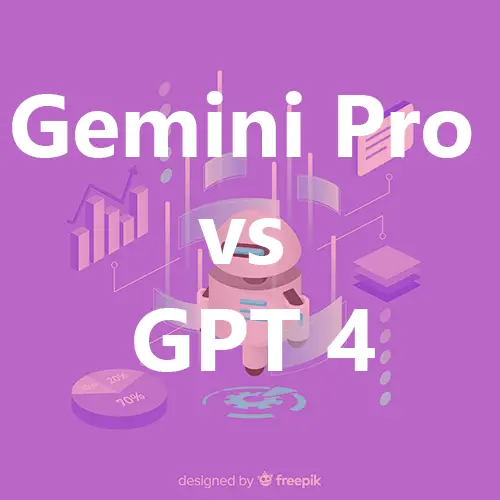Gemini Pro vs GPT 4: Unveiling the Ultimate Writing Showdown
Introduction to Gemini Pro vs GPT 4
Understanding Gemini Pro
-
- Features and Capabilities
- Use Cases
- Pros and Cons
Introducing GPT 4
-
- Advancements from Previous Versions
- Key Features
- Applications
Gemini Pro vs GPT-4: A Comparative Analysis
-
- Performance
- Accuracy
- Flexibility
- User Interface
Use Cases and Industries
-
- Content Creation
- Customer Service
- Research and Analysis
Pricing and Accessibility
Future Implications
Conclusion
Gemini Pro vs GPT 4
Artificial Intelligence has revolutionized various sectors, particularly in natural language processing. Among the latest advancements, Gemini Pro and GPT 4 stand out as leading contenders in the field. Now let’s compare and contrast these two advanced technologies.
Introduction to Gemini Pro and GPT 4
Gemini Pro and GPT-4 represent significant milestones in AI development. While both succeed in natural language processing, they differ in various aspects, including performance, accuracy, and applications.
Understanding Gemini Pro
-
Features and Capabilities
Gemini Pro, developed by AIPRM Corp., boasts innovative features tailored for content creation, customer service, and data analysis.
-
Use Cases
Gemini Pro finds applications in various industries, including marketing, healthcare, and finance. Its ability to generate high-quality content and streamline customer interactions makes it a valuable asset for businesses.
-
Pros and Cons
Pros:
- Advanced content generation capabilities
- Enhanced customer engagement
- Versatile applications across industries
Cons:
- A steeper learning curve for some users
- Limited customization options
Introducing GPT-4
-
Advancements from Previous Versions
GPT-4, the latest release of OpenAI’s well-known language model, builds upon the successes of its predecessors. With enhanced algorithms and expanded training data, GPT-4 sets new standards for AI-driven text generation.
-
Key Features
GPT-4 offers unparalleled text generation capabilities, with improved consistency, context understanding, and language fluency. Its adaptive learning algorithms enable it to generate human-like text across various domains.
-
Applications
From content creation to automated customer support, GPT-4 finds applications in diverse fields, including journalism, e-commerce, and education. Its ability to understand and generate contextually relevant text makes it a versatile tool for businesses and individuals alike.
Gemini Pro vs GPT 4: A Comparative Analysis
Performance
Gemini Pro excels in generating highly tailored content, with a focus on user-specific requirements. On the other hand, GPT-4 offers broader adaptability, making it suitable for a wide range of tasks.
Accuracy
Both Gemini Pro and GPT 4 exhibit impressive accuracy in text generation. However, GPT-4’s larger training dataset contributes to its superior performance in understanding and generating hidden text.
Flexibility
While Gemini Pro provides robust customization options, GPT-4 offers unparalleled flexibility in adapting to diverse tasks and contexts. Its ability to generate logical and contextually relevant text across various domains gives it a competitive edge.
User Interface
Gemini Pro offers a user-friendly interface, with sensitive controls and customizable features. In contrast, GPT-4’s interface may require some familiarity with AI technology, but its extensive documentation and community support facilitate ease of use.
Use Cases and Industries
Gemini Pro and GPT-4 accommodate to a wide range of industries and use cases:
- Content Creation: Both platforms enable automated content generation, streamlining the process for marketers, writers, and publishers.
- Customer Service: Gemini Pro and GPT 4 facilitate automated responses and chatbot interactions, improving customer satisfaction and efficiency.
- Research and Analysis: Researchers and analysts benefit from the data processing capabilities of Gemini Pro and the contextual understanding of GPT4, enhancing insights and decision-making.
Pricing and Accessibility
Gemini Pro and GPT 4 offer various pricing plans tailored to individual and enterprise needs. While Gemini Pro may require a higher initial investment, its targeted features justify the cost. GPT-4, with its open-access API, provides affordability and accessibility to a wider audience.
Future Implications
As AI continues to evolve, Gemini Pro and GPT-4 represent significant advancements in natural language processing. Their capabilities hold immense potential for transforming industries, reshaping communication, and driving innovation.
Conclusion
In the domain of AI-driven text generation, Gemini Pro and GPT 4 stand out as leading solutions, each with its unique strengths and applications. While Gemini Pro excels in tailored content creation and customer engagement, GPT-4 offers unmatched flexibility and adaptability across diverse tasks and domains. Ultimately, the choice between these platforms depends on specific requirements, preferences, and budget constraints.
Unique FAQs
- Is Gemini Pro suitable for small businesses?
- Yes, Gemini Pro offers scalable solutions designed for businesses of all sizes, with customizable features to meet individual needs.
- Can GPT-4 generate code snippets?
- While GPT-4 primarily focuses on natural language processing, it can generate basic code snippets based on provided context and instructions.
- How does Gemini Pro handle multi-language content generation?
- Gemini Pro supports multi-language content generation, with features for translation and localization to target diverse audiences effectively.
- Does GPT-4 require extensive training data for optimal performance?
- While a larger training dataset can enhance GPT-4’s performance, it can still generate high-quality text with relatively smaller datasets, thanks to its advanced algorithms.
- Are there any ethical considerations when using AI-driven text generation tools like Gemini Pro and GPT-4?
- Yes, ethical considerations, such as ensuring transparency, accountability, and avoiding biased outputs, are crucial when utilizing AI-driven text generation tools to uphold integrity and reliability in content creation.

